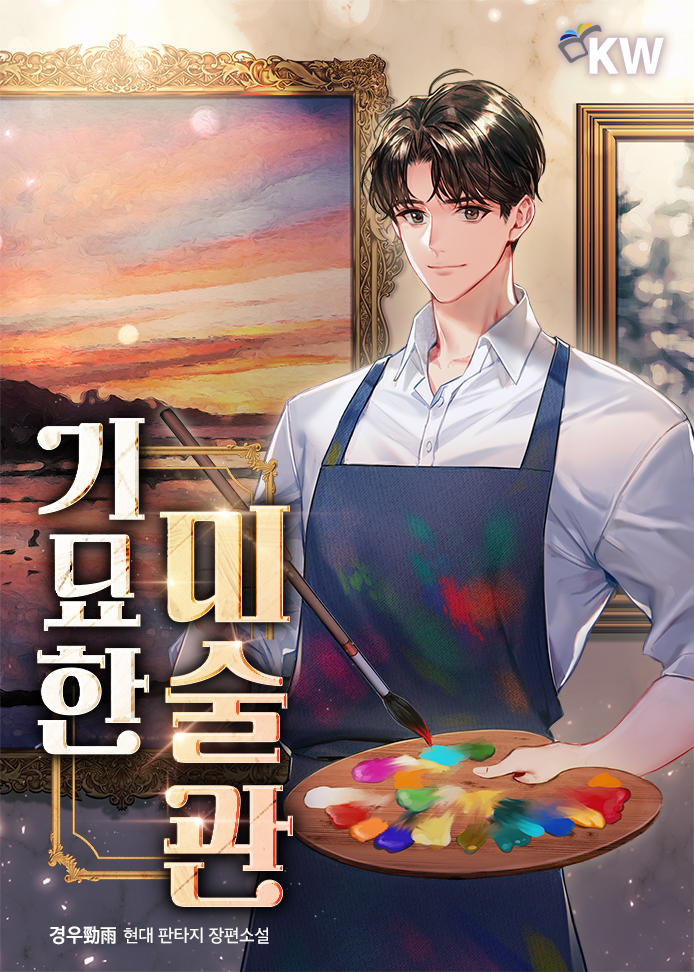Many know that he painted the theater poster for Sarah Bernhardt. They also know that hecreated many promotional posters for advertisements.
I especially liked his promotional poster for a printing company.
He depicted the god Faunus for the printing company's promotion, a deity who in ancient times governed forests, procreation, livestock, and agriculture.
Why would he depict such a deity for a printing company's promotion?
The paper used by the printing company came from pulp. Pulp comes from forests.
All printed materials continually multiply, thus relating to procreation.
It's an incredible thought.
Moreover, he drew several eyes surrounding the poster, representing the eyes of readers absorbing and accommodating the information disseminated by the printing company.
I looked at the last appearance of the painter I loved and asked,
“May I ask you one question, teacher?”
“Cough, cough. Yes, go ahead.”
I hesitated for a moment before speaking.
“Teacher, you spent the last 20 years depicting the history and identity of the Slavic people through your paintings. Having been one of the top commercial artists in France during your youth, why did you switch to a completely different style of painting in your later years?”
I had always been curious about this.
Was it because he feared being remembered only as a commercial artist?
Or did he want to leave a legacy as a pure artist? These were just speculations.
Mucha stopped praying and fumbled near where my hand was. Sensing his desire to hold it, I firmly grasped his left hand with both of mine.
Relying on the warmth I provided, Mucha began to speak.
“Many have asked me that question. They ask if I was scared as I got older. If I painted those pictures using the pride of the Slavic people as a weapon because I wanted to leave a legacy.”
People in modern times think this way, so those of his era probably thought even more so. Mucha slightly gripped my hand and said,
“What is art?”
“............................”
Could anyone answer that question easily?
It’s not that I had never thought about it, but it was always a question to which I couldn’t easily find an answer.
Waiting for my silent response, Mucha continued.
“Art should never be far away. It is art when the place within my sight becomes beautiful. I wanted art to be integrated into people's lives, to give them the opportunity to shape their own lives.”
A resonance and echo formed in my heart.
It felt like someone was striking a large bell hidden near my heart.
So that's why he chose commercial art.
To convey the richness and beauty of life to people.
With a trembling voice, I asked,
“For whom and for what did you create art?”
Mucha smiled faintly.
“I always did what I loved. But I wanted to live a life of service to others with the talent I had. I always wanted to do something that would be of help to the world.”
Hearing his words, I held his hand tightly and closed my eyes.
“You have helped people sufficiently.”
Is it because of his Slavic Epic, through which he left a legacy of national pride and identity?
No, it's more than that. The Germanic nationalism that emerged around that time was violent.
However, Mucha's nationalism portrayed victims and sufferers, appealing for peace through the depiction of war's agony.
And such efforts contributed to the advent of a peaceful era.
Strength gently fades from Mucha's hand.
“My last works aimed not at destruction, but at rebuilding and uniting. I hoped humanity would lead each other through this and gain a deeper understanding of one another…”
Mucha's hand slips away.
“Did my life truly help mankind?”
“............................”
I watched Mucha, now fallen into sleep, quietly.
‘Of course, your life was of great help to mankind.’
It wasn't just about unifying his country by making known the identity of the Slavic people.
I am Korean. Every Korean has been helped by this man, but many do not know it.
Alphonse Mucha was commissioned by the Austrian royal family, which was ruling Czech at the time, for a national promotional poster for the 1900 Paris World's Fair, from April to November.
Being one of the oppressed people, it must have been unbearably hard for him.
Four years later, he left all his success behind and went to America to find a sponsor for his Slavic epic.
That's when he met Charles Richard Crane.
He was a very wealthy businessman and a friend of Woodrow Wilson, the 28th President of the United States, and thus held high social status.
Mucha approached him and conveyed the spirit of the oppressed Slavic people, and Charles Richard Crane, moved by this, decided to sponsor him.
What does this have to do with Koreans?
Having learned what life was like for an oppressed nation, Charles visited our country during the Japanese occupation era.
There, he met and spoke with Ye Un-hyung, a Korean independence activist, and received the Korean Declaration of Independence, which he then delivered to President Wilson.
In a way, he contributed to the independence movement.
Additionally, Charles Richard Crane was pivotal in bringing global attention to Korea's sovereignty.
And it was Alphonse Mucha who elevated his national consciousness.
Standing beside Alphonse Mucha, now deeply asleep, never to awaken again, I bowed deeply.
"Thank you."
His last words keep echoing in my ears.
"Did my life truly help mankind?"
Read ahead by supporting me on Ko-fi. Access 5 advance chapters with the Doddle Dabbler Tier ($8) or 10 advance chapters with Artist Apprentice Tier ($15) For every $10 collected on Ko-fi, I will release an extra chapter. Choose your tier by clicking the 'Support me' button! Rate and review this novel on NU to help people find is novel. Bonus chapters on reaching milestones. Happy reading!

